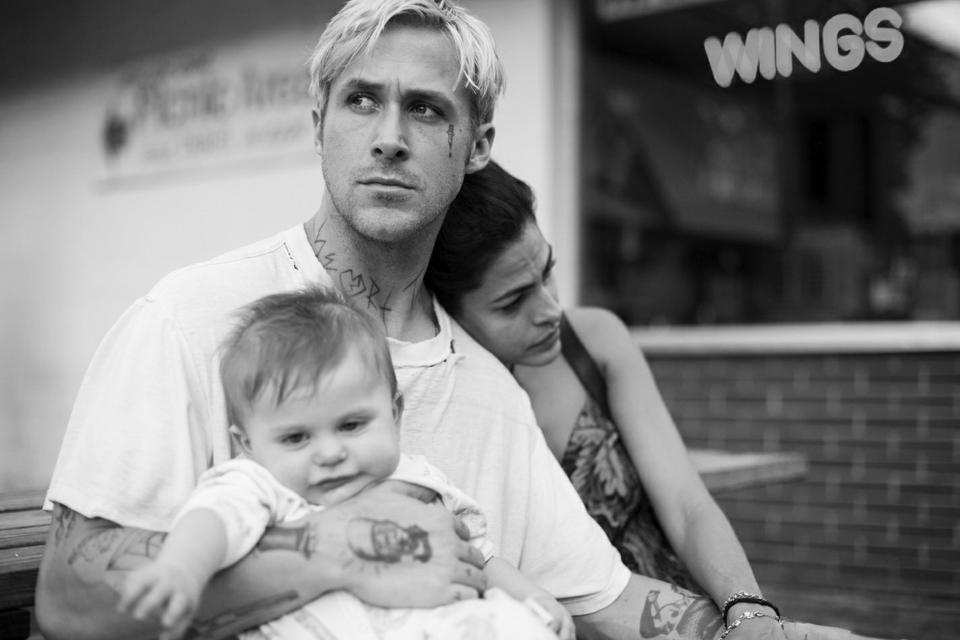
News
Summers Will Not Finish Semester of Teaching as Harvard Investigates Epstein Ties

News
Harvard College Students Report Favoring Divestment from Israel in HUA Survey

News
‘He Should Resign’: Harvard Undergrads Take Hard Line Against Summers Over Epstein Scandal

News
Harvard To Launch New Investigation Into Epstein’s Ties to Summers, Other University Affiliates

News
Harvard Students To Vote on Divestment From Israel in Inaugural HUA Election Survey
"Pines" Stylish but Confused
The Place Beyond the Pines –- Dir. Derek Cianfrance (Focus Features) –- 3.5 Stars

The title of “The Place Beyond the Pines” refers to no mystical forest haven. It’s no cryptic allusion either, but simply the Mohawk-to-English translation of Schenectady, a small city in New York. But writer and director Derek Cianfrance’s new film would lead you to believe otherwise. His style brings an otherworldly aura to this cinematic tale of crime and family, a sense that the seemingly small-scale events on screen are part of something greater. It is this distinct aesthetic, coupled with a diverse array of emotive performances, that help keep a sprawling—perhaps sometimes directionless—story feeling like a cohesive, often quite engaging whole.
Ryan Gosling, who seems to be everywhere these days, plays Luke Glanton, a motorcycle racer who spends his nights zipping around a cage in a seedy traveling fair. Cianfrance previously worked with Gosling on 2010’s “Blue Valentine,” and the actor’s character here is much more similar to that film’s Dean or to the quietly disturbed protagonist of “Drive” than to Gosling’s slicker, more loquacious roles in films like “Crazy, Stupid, Love.” and “The Ides of March.” The first shots of the film focus on Gosling’s muscle-bound back, speckled with amateurish body art of varying shape and size. The web of tattoos—indeed, one even depicts a spider web—mirrors the way the tough but reticent Luke is trapped by his mindless routine; however, when he reunites with an old flame, Romina (Eva Mendes), a life-changing complication arises in the form of an infant son he unwittingly abandoned one year earlier.
Suddenly overcome by a driving need to care for Romina and her boy, Luke leaves the circus in Schenectady and begins robbing banks by motorcycle to support Romina. She disapproves but can’t help succumbing at least a bit to Luke’s charm. Yet in the midst of a series of high-octane bike chases, the movie snaps focus suddenly—jarringly, even—to Avery Cross (Bradley Cooper), a straight-laced cop whose fateful run-in with Luke sticks with him for life. Despite having received much acclaim for his Oscar-nominated turn in “Silver Linings Playbook,” in which Cooper proved that he can bring both sensitivity and intensity to a role, he still seems eager to prove himself as a serious actor. This ambition translates well to Cross’s character, who is hungry for a promotion at any price.
As the story winds on like the twisting Schenectady roads, the powerful players in the film seem a bit short-changed. Mendes’s spunky spirit and emotional instability are convincing, but after the first hour she is relegated to gazing off somberly in the background. Ray Liotta is downright scary as a crooked cop in Cross’s precinct; he absolutely dominates his seven-ish minutes of screen time but vanishes as quickly as he comes. Even the central characters—first Gosling and then Cooper—fade away as the plot moves 15 years beyond them to focus on their neglected sons’ tales. In this way, the film cannot focus satisfactorily on any of its characters’ psyches; it comes closest in the way it examines Cross’s traumas and struggles against corruption, but it moves so quickly away from his story that this exploration feels shallow.
It is ultimately Cianfrance’s strong sense of style that holds the meandering film together. Small-scale drama is intercut with sweeping shots of Northeastern forests and Technicolor sunsets, as if to remind the viewer that the focus of the film is not the small machinations and contours of the plot but rather the landscape as a whole. Quiet scenes of romance and reflection are backed by a score (courtesy of Faith No More frontman Mike Patton) that melds shimmering guitar, ’80s electronics, and icy, operatic voices, creating an overwhelmingly ethereal vibe.
“We do what we do, but when we do it together…Shazam!” says Robin Van Der Zee (Ben Mendelsohn), Luke’s partner in crime. The two men find success by exploiting their individually narrow skill sets for all they offer, and Cianfrance, in a way, has done the same thing with his story. Each player, each individual event, donates a small but powerful piece to the whole; the parts may not satisfy, but with a little magic, the sum works much better. By the end of the film, the characters have faded to the background, and for once, style has saved lack of substance.
—Staff writer Tree A. Palmedo can be reached at treepalmedo@college.harvard.edu.
Want to keep up with breaking news? Subscribe to our email newsletter.
